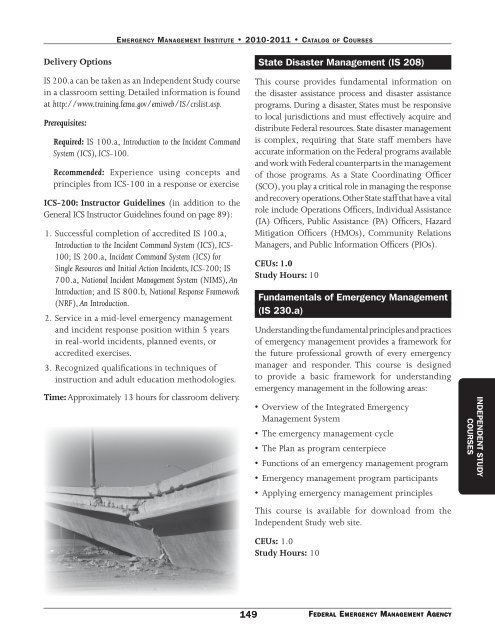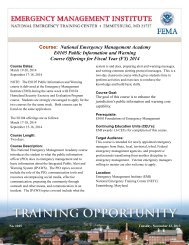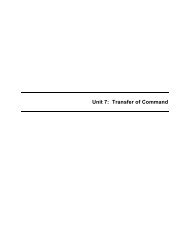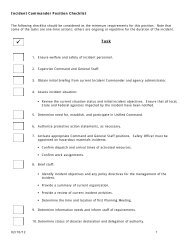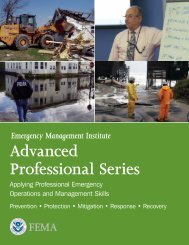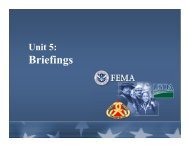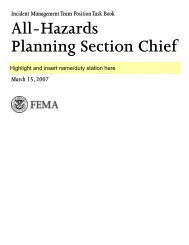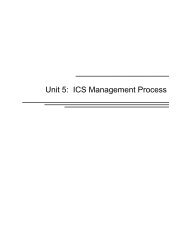enrollment for emi courses - Emergency Management Institute ...
enrollment for emi courses - Emergency Management Institute ...
enrollment for emi courses - Emergency Management Institute ...
You also want an ePaper? Increase the reach of your titles
YUMPU automatically turns print PDFs into web optimized ePapers that Google loves.
Delivery Options<br />
EmE r g E n c y ma n a g E m E n t In s t I t u t E • 2010-2011 • ca t a l o g of co u r s E s<br />
IS 200.a can be taken as an Independent Study course<br />
in a classroom setting. Detailed in<strong>for</strong>mation is found<br />
at http://www.training.fema.gov/<strong>emi</strong>web/IS/crslist.asp.<br />
Prerequisites:<br />
Required: IS 100.a, Introduction to the Incident Command<br />
System (ICS), ICS-100.<br />
Recommended: Experience using concepts and<br />
principles from ICS-100 in a response or exercise<br />
ICS-200: Instructor Guidelines (in addition to the<br />
General ICS Instructor Guidelines found on page 89):<br />
1. Successful completion of accredited IS 100.a,<br />
Introduction to the Incident Command System (ICS), ICS-<br />
100; IS 200.a, Incident Command System (ICS) <strong>for</strong><br />
Single Resources and Initial Action Incidents, ICS-200; IS<br />
700.a, National Incident <strong>Management</strong> System (NIMS), An<br />
Introduction; and IS 800.b, National Response Framework<br />
(NRF), An Introduction.<br />
2. Service in a mid-level emergency management<br />
and incident response position within 5 years<br />
in real-world incidents, planned events, or<br />
accredited exercises.<br />
3. Recognized qualifications in techniques of<br />
instruction and adult education methodologies.<br />
Time: Approximately 13 hours <strong>for</strong> classroom delivery.<br />
149<br />
state Disaster management (Is 208)<br />
This course provides fundamental in<strong>for</strong>mation on<br />
the disaster assistance process and disaster assistance<br />
programs. During a disaster, States must be responsive<br />
to local jurisdictions and must effectively acquire and<br />
distribute Federal resources. State disaster management<br />
is complex, requiring that State staff members have<br />
accurate in<strong>for</strong>mation on the Federal programs available<br />
and work with Federal counterparts in the management<br />
of those programs. As a State Coordinating Officer<br />
(SCO), you play a critical role in managing the response<br />
and recovery operations. Other State staff that have a vital<br />
role include Operations Officers, Individual Assistance<br />
(IA) Officers, Public Assistance (PA) Officers, Hazard<br />
Mitigation Officers (HMOs), Community Relations<br />
Managers, and Public In<strong>for</strong>mation Officers (PIOs).<br />
CEUs: 1.0<br />
Study Hours: 10<br />
fundamentals of <strong>Emergency</strong> management<br />
(Is 230.a)<br />
Understanding the fundamental principles and practices<br />
of emergency management provides a framework <strong>for</strong><br />
the future professional growth of every emergency<br />
manager and responder. This course is designed<br />
to provide a basic framework <strong>for</strong> understanding<br />
emergency management in the following areas:<br />
• Overview of the Integrated <strong>Emergency</strong><br />
<strong>Management</strong> System<br />
• The emergency management cycle<br />
• The Plan as program centerpiece<br />
• Functions of an emergency management program<br />
• <strong>Emergency</strong> management program participants<br />
• Applying emergency management principles<br />
This course is available <strong>for</strong> download from the<br />
Independent Study web site.<br />
CEUs: 1.0<br />
Study Hours: 10<br />
FEd E r A L Em E r g E N C y mA N A g E m E N T Ag E N C y<br />
InDEpEnDEnt stuDy<br />
cOursEs


